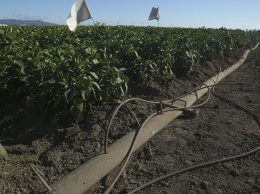Groundwater plan is serious business in Ventura County
IN THIS ARTICLE
- Agribusiness Topic
- Marissa Wenzke Author
By Marissa Wenzke Friday, February 6th, 2015
Officials in Ventura County are moving with deliberate speed to implement the three-bill package known as the Sustainable Groundwater Management Act, which took effect on Jan. 1.
The act, commonly known as SGMA, collectively provides a framework for local officials to establish sustainable management of groundwater supplies.
It sets out to create groundwater sustainability agencies, or GSAs, and their plans for sustainability within five to seven years; for high-priority basins with especially depleted supplies, agencies must be formed by 2017. Local agencies are expected to have fully implemented plans and achieve long-term sustainability levels within 20 years.
“We’ve had several stakeholder meetings since September,” said Ventura County Public Works Director Jeff Pratt. In Ventura County, there are 32 groundwater basins and at least 12 of them are high- and medium-priority. With such a large number of quickly-depleting aquifers, the county went beyond the standards of SGMA and implemented a well-drilling moratorium in December.
The countywide moratorium, which also affected basins not labelled as high-priority, was met with criticism from advocacy groups for local farmers such as the Ventura County Coalition of Labor, Agriculture and Business and Ventura County Farm Bureau.
Pratt said the move was intended to essentially buy time for GSAs to be formed prior to the effective date of Jan. 1 for SGMA.
“The county just wanted that to help give agencies time to form and decide whether or not a moratorium was necessary,” he said.
However, once SGMA went into effect in January, the moratorium was no longer in effect for basins that are not considered high-priority. As Ventura County officials have worked to implement SGMA, they have found that the Arroyo Santa Rosa Groundwater Basin is seeking to form its own GSA, without heavy input from the county, and are looking to work with the state directly.
“They want to consult with the county, but they’re not interested in a partnership,” Pratt said. “They say that’s just another level of bureaucracy.”
Meanwhile, in the city of Ventura, the Fox Canyon Groundwater Management Agency has been managing groundwater supplies since 1982, when it was designated by the state legislature to sustainably manage resources within the areas overlying the Fox Canyon aquifer.
SGMA intends to give power to local agencies such as Fox Canyon and Arroyo Santa Rosa, but if these agencies and county officials fail to form GSAs and accompanying sustainability plans in time, the state will intervene.
“If a GSA is not formed and the county is unavailable to be the GSA, then the state will come in and bring the basin into a sustainable state,” said Wade Horton, public works director for San Luis Obispo County.
Currently San Luis Obispo is focusing much of its efforts on developing a GSA and sustainability plans for the Paso Robles Basin, as Horton said officials were in the process of doing this prior to SGMA’s signing.
On Jan. 27, Horton and other officials presented their progress on the Paso Robles basin to the County Board of Supervisors. Horton said the county is still in the process of identifying stakeholders and will be doing public outreach to stakeholders, particularly farmers, in the coming months.
“Growers recognize that water is critical to their operation and want to make sure that resources are available to them now and in the future so they can sustain production,” he said.
Related Articles
Our View: California braces for another dry summer
 Thursday, June 24th, 2021
Thursday, June 24th, 2021










